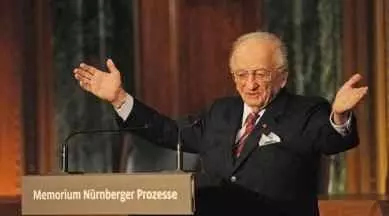
Nuremberg's last surviving prosecutor passes away at 103
text_fieldsBenjamin Ferencz, the final living prosecutor from the Nuremberg trials in Germany that prosecuted Nazi war criminals after World War Two and a longtime supporter of international criminal law, passed away on Friday at the age of 103, according to NBC News, which cited his son.
A Harvard-educated attorney, Ferencz succeeded in convicting a number of German officials who oversaw roving execution squads throughout the war. His death's circumstances weren't immediately made public. According to The New York Times, Ferencz passed away in a Florida facility for assisted living in Boynton Beach.
He was only 27 years old when he served as a prosecutor in Nuremberg in 1947, where Nazi defendants, including Hermann Göring, were tried for crimes against humanity, including the Holocaust, a mass killing of six million Jews and millions of others.
The international tribunal which is located in The Hague, Netherlands, was the result of decades of Ferencz's advocacy for the establishment of an international criminal court. This goal was achieved as a result of his decades-long advocacy. Additionally, Ferencz made a sizable donation to the U.S. Holocaust Memorial Museum, which was created in Washington.
"Today the world lost a leader in the quest for justice for victims of genocide and related crimes. We mourn the death of Ben Ferencz—the last Nuremberg war crimes prosecutor. At age 27, with no prior trial experience, he secured guilty verdicts against 22 Nazis," the U.S. Holocaust Museum said in a post on Twitter.
At Nuremberg, Ferencz was appointed chief prosecutor for the United States in the case of 22 commanders who oversaw the Einsatzgruppen, a group of mobile paramilitary assassination squads that belonged to the notorious Nazi SS. Over a million people were killed by the squads throughout the war in German-occupied Europe as they carried out mass executions of Jews, gypsies, and other people, mostly civilians.
"It is with sorrow and with hope that we here disclose the deliberate slaughter of more than a million innocent and defenceless men, women, and children," Ferencz said in his opening statement at the trial.
"This was the tragic fulfillment of a program of intolerance and arrogance. Vengeance is not our goal, nor do we seek merely a just retribution. We ask this court to affirm by international penal action man's right to live in peace and dignity regardless of his race or creed. The case we present is a plea of humanity to law," Ferencz added.
The convicted officials, according to Ferencz, meticulously carried out extensive plans to eliminate racial, national, political, and religious groupings that were "condemned in the Nazi mind."
"Genocide - the extermination of whole categories of human beings - was a foremost instrument of the Nazi doctrine," Ferencz said.
All of the accused were found guilty, and 13 received death sentences. It was the first case of Ferencz's career.
Ferencz, who was born on March 11 in Transylvania, Romania, immigrated to the United States with his family when he was 10 months old. He grew up in the impoverished neighbourhood of 'Hell's Kitchen' in New York City. He enlisted in the American military after earning his law degree from Harvard in 1943, serving in Europe before joining the newly established war crimes section of the American Army.
"What was most significant about it was it gave us and it gave me an insight into the mentality of mass murderers," Ferencz said in a 2018 interview with the American Bar Association.
"They had murdered over a million people, including hundreds of thousands of children in cold blood, and I wanted to understand how it is that educated people - many of them had PhDs or they were generals in the German Army - could not only tolerate but lead and commit such horrible crimes."
Ferencz tried to obtain compensation for Holocaust victims and survivors after the Nuremberg trials. Later, Ferencz promoted the establishment of an international criminal court. The International Criminal Court was established in 1998 in Rome by a treaty that was ratified by 120 nations and took effect in 2002.
In the court's first hearing, he participated at the age of 91 by making the closing argument in the prosecution of the Congolese warlord Thomas Lubanga Dyilo, who was found guilty of war crimes.
Over the years, Ferencz has criticised his own nation's acts, especially those made during the Vietnam War. He published an editorial post in the New York Times in January 2020 in which he referred to the U.S. execution of a senior Iranian military official in a drone operation as an "immoral action" and "a clear violation of national and international law."
"The reason I have continued to devote most of my life to preventing war is my awareness that the next war will make the last one look like child's play," he told the bar association in 2018. "... 'Law, not war' remains my slogan and my hope."






